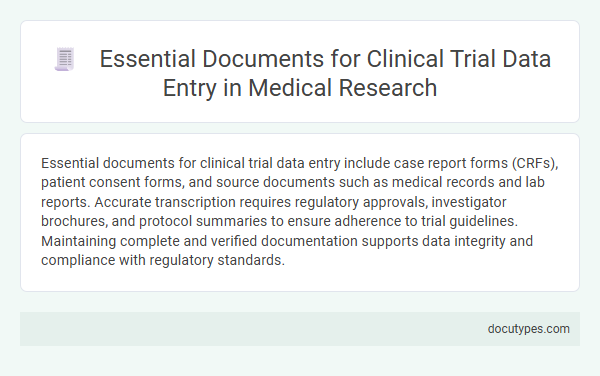Essential documents for clinical trial data entry include case report forms (CRFs), patient consent forms, and source documents such as medical records and lab reports. Accurate transcription requires regulatory approvals, investigator brochures, and protocol summaries to ensure adherence to trial guidelines. Maintaining complete and verified documentation supports data integrity and compliance with regulatory standards.
Introduction to Essential Clinical Trial Documents
Accurate clinical trial data entry depends on comprehensive documentation to ensure validity and regulatory compliance. Essential clinical trial documents serve as the foundation for capturing, verifying, and auditing trial data throughout the study lifecycle.
- Informed Consent Forms - Documents confirming participant agreement and understanding of trial procedures and risks.
- Case Report Forms (CRFs) - Structured forms used to systematically collect all clinical trial data from each participant.
- Regulatory Approval Letters - Official documents granting authorization to conduct the clinical trial from regulatory bodies.
Regulatory Requirements for Data Entry Documentation
Clinical trial data entry requires specific regulatory documents to ensure accuracy and compliance. Essential documents include Case Report Forms (CRFs), Informed Consent Forms (ICFs), and Source Documents that validate patient information and trial outcomes. You must maintain these records according to guidelines set by regulatory authorities like the FDA and EMA to support data integrity and audit readiness.
Investigator Site File: Key Components
| Document Type | Key Components | Purpose |
|---|---|---|
| Investigator Site File (ISF) |
|
Facilitates organized, compliant data entry and allows for efficient monitoring and auditing of clinical trial activities at your site. |
Case Report Forms (CRFs) Management
Efficient clinical trial data entry relies heavily on accurate management of Case Report Forms (CRFs). These documents capture essential patient data and trial progress details for regulatory compliance and analysis.
- Case Report Forms (CRFs) - Structured documents used to record all clinical trial data points from each participant during the study.
- Source Documents - Original medical records and clinical notes that validate data entered in the CRFs for accuracy and verification purposes.
- Data Query Forms - Forms used to resolve inconsistencies or missing information in the CRFs, ensuring data integrity before final entry.
Informed Consent Documentation Standards
Accurate clinical trial data entry hinges on rigorous documentation standards, especially regarding informed consent. Proper handling of informed consent documents ensures both ethical compliance and data integrity throughout your trial.
- Informed Consent Forms (ICF) - These must be signed and dated by participants before any trial-related procedures begin to validate voluntary participation.
- Version Control Records - Maintaining records of all ICF versions guarantees that data corresponds to the correct consent document used during the trial phase.
- Consent Process Documentation - Detailed notes on how and when consent was obtained must be documented to confirm adherence to ethical guidelines.
Ensuring these documentation standards are met is essential for reliable clinical trial data entry and regulatory compliance.
Source Documents and Data Verification
Source documents are the original records containing patient information and clinical trial data, such as medical charts, laboratory reports, and consent forms. These documents serve as the primary evidence for verifying the accuracy and completeness of trial data entered into the database.
Data verification involves cross-checking entered data against source documents to ensure consistency and reliability. Clinical trial monitors and data managers perform source data verification (SDV) to identify discrepancies or missing information. Accurate source documents and thorough data verification are crucial for maintaining data integrity and regulatory compliance.
Electronic Data Capture (EDC) System Records
What types of documents are required for clinical trial data entry in an Electronic Data Capture (EDC) system? Essential documents include source documents, case report forms (CRFs), and informed consent forms. These ensure accurate data collection, regulatory compliance, and patient safety throughout the trial process.
Data Management Plan Essentials
Clinical trial data entry requires a variety of essential documents to ensure accuracy and regulatory compliance. Key documents include case report forms, informed consent forms, source documents, and monitoring reports.
The Data Management Plan (DMP) is vital for outlining procedures related to data collection, validation, and security. Your DMP must detail data handling protocols, quality control measures, and timeline management to guarantee reliable trial results.
Adverse Event Reporting Documentation
Accurate adverse event reporting documentation is crucial for clinical trial data entry, ensuring patient safety and regulatory compliance. Key documents include adverse event case report forms, investigator safety reports, and participant medical histories. You must submit timely and detailed records to maintain trial integrity and facilitate effective data analysis.
What Types of Documents Are Required for Clinical Trial Data Entry? Infographic

